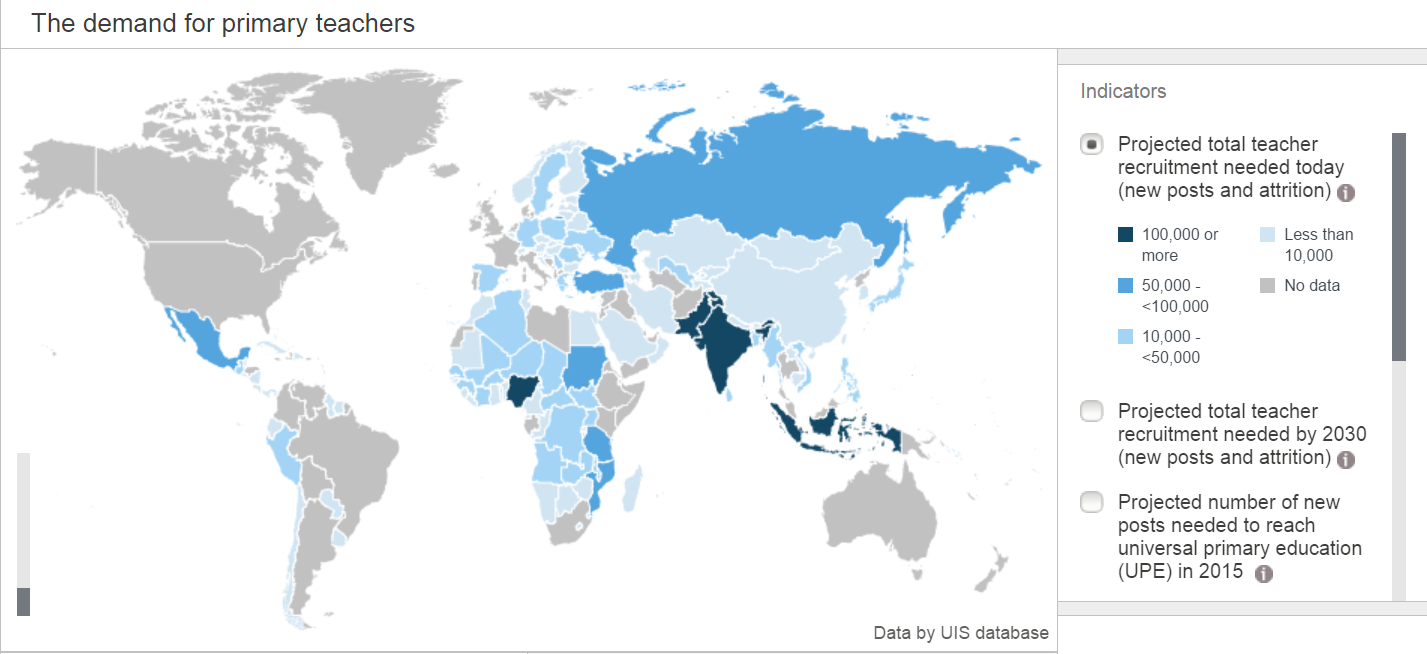Where are the worst teacher shortages?

Stay up to date:
Education
Education is fundamental to building healthy societies and economies, but a lack of teachers in many countries is holding back progress.
Across the world at least 74 countries face an acute shortage of teachers. This results in millions of children being excluded from primary education and beyond.
The Global Goals have a specific goal aimed at ensuring every child has access to a quality education by 2030, but data from the UN shows that to achieve this we will need to recruit nearly 26m new teachers.
Map 1: Projected total teacher recruitment needed today
The UN has created an interactive map to explore the issues of teacher shortages. It shows both current gaps and projected recruitment needed by 2030.
Currently Nigeria faces the biggest shortages – the West African nation needs an additional 380,000 teachers. India also faces shortages in excess of 350,000, while Indonesia needs nearly 190,000 more teachers.
Map 2: Projected total teacher recruitment needed by 2030 (new posts and attrition)
Source: UN
Conversely, by 2030, China will need another 3.5m teachers, India 3m and Indonesia 1.2m, as shown in the map above.
The UN also outlines the countries that are closing their teaching gaps, with progress being made particularly in Africa. Mozambique is due to end its teacher shortage by 2020, while also reducing the pupil-to-teacher ratio. Chad, Guyana and Mali should close their gaps shortly after, in 2022, based on current trends.
Various initiatives have made this possible, including a strategic government plan in Mozambique, the Global Partnership for Education investment in Chad and a World Bank project in Guyana.
To keep up with the Agenda subscribe to our weekly newsletter.
Author: Joe Myers is a Digital Content Producer at Formative Content.
Image: A teacher writes the phrase “Today it is the start of the new school year” on the blackboard of her classroom on the first day of the new school year at a primary school in Nice, September 3, 2013. REUTERS/Eric Gaillard.
Don't miss any update on this topic
Create a free account and access your personalized content collection with our latest publications and analyses.
License and Republishing
World Economic Forum articles may be republished in accordance with the Creative Commons Attribution-NonCommercial-NoDerivatives 4.0 International Public License, and in accordance with our Terms of Use.
The views expressed in this article are those of the author alone and not the World Economic Forum.
Forum Stories newsletter
Bringing you weekly curated insights and analysis on the global issues that matter.
More on Education and SkillsSee all
Laurel Taylor
August 18, 2025
Antara Choudhury and Vivin Rajasekharan Nair
August 14, 2025
Rawan bint Najeeb Tawfeeqi
August 11, 2025
Neeti Mehta Shukla
August 1, 2025
Naoko Tochibayashi
July 30, 2025






